Carlo Maria Rossi and Penny Kwan just started a new residency space in the water town Zhujiajiao, outside of Shanghai: No.name Studio is a studio, residency space, and a gallery for artists and collectors. No.Name aims to host and work with art professionals and institutions from all over the world, striving to spur creative energy and enlightening conversations.
China Residencies: Can you tell us about when and how the idea came about for this new residency?
Carlo: No.name Studio started from an interesting coincidence. Last September, Penny and I were invited to participate in the 58th Venice Biennale to create a video installation work for the China Pavilion. After we came back from Venice, Penny called me and said, "Carlo, I'm looking for an art space." I told her that’s great, and that I also wanted to build a big loft outside of Shanghai. She continued asking me about Zhujiajiao, whether I have heard of it, and told me that it’s also called the "Chinese Venice"… So thinking about setting up a space in Zhujiajiao was a fitting coincidence after the installation in Venice in Italy.
Finally, I went to visit. I was fascinated by this small water town. When we first saw the space, it was just an old abandoned factory warehouse. It's spacious. As an artist, I knew immediately that to live and work in such a big space would be a dream for any creative. So, we immediately decided to rent it and re-decorate it. Our first idea was to turn it into an artist's studio, but then we decided on an artist residency. This is because we also wanted our own gallery, own bar, and living space. With all these ideas, we finally found that making the space an artist residence would be the best form to realize all of it.
Penny: I am a person who likes to immerse herself in art. Last year, after Carlo and I finished the visual arts installation together, we found out that we share similar views on art spaces. For the emergence of the residency, I was imagining a girl who lives in a city and is getting tired of the urban life, she wants to find a new way of life outside the city. China's urban expansion and the growth of contemporary art has changed the way young people think about space. This change is also one of the reasons that brings us to Zhujiajiao. We want to create a new kind of artistic life outside the city, where you immerse yourself in a complex space that is a gallery, creative space, a residency and outdoor space all at the same time. It is a fusion of art and everyday life.
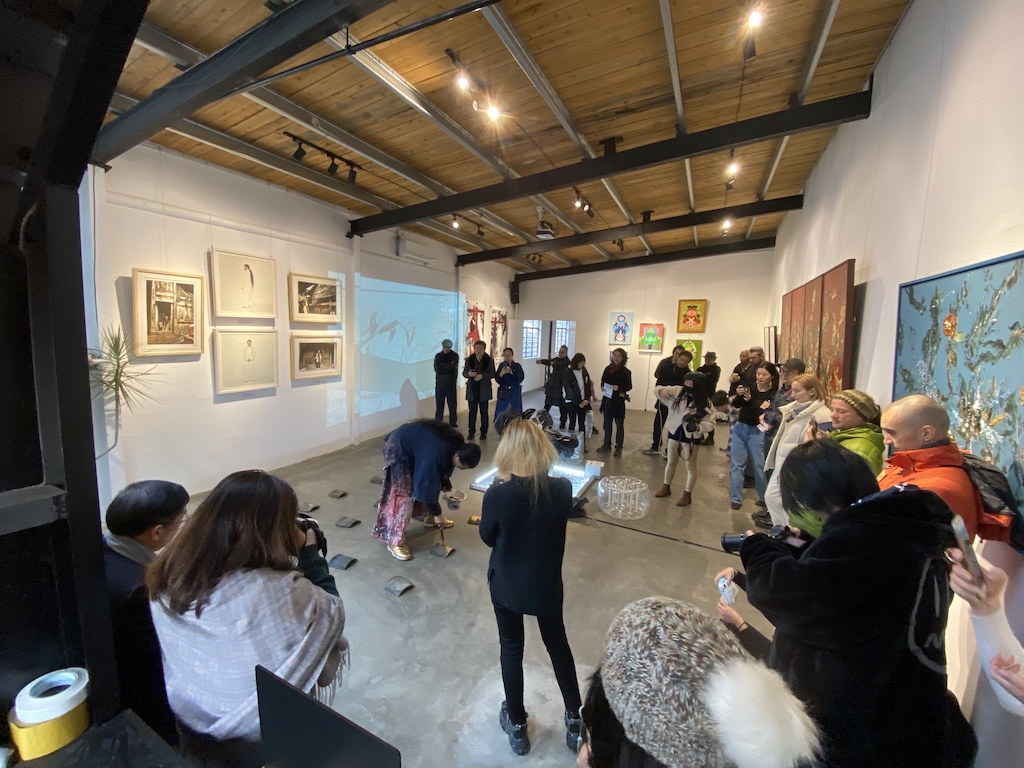

No.name Studio
Carlo: The name for No.name Studio came from a conversation I had with Penny. We know that we have a clear concept of this place, an artist residency where we can integrate everything we care about. We want to invite different artists, but people will not know which artists will be there at the same time as them. So, we thought why don’t we just call it No.name Studio. It sounds cool. It sounds great. Also, there was an important Chinese underground contemporary art group, known as the nameless or ‘no name painting society’, so our name is also a tribute to them, a critical mark in the history of Chinese art.
Penny: There is another layer of meaning of No.name, that is to say, it is a space without boundaries. We want to cooperate with various art forms without limits or standards. It might become a starting place for innovation.
China Residencies: Can you tell us a little bit more about yourself? You are both artists - Carlo, you worked on set-design for brands like Jaguar - and Penny, a creative working in multimedia. Is that right?
Carlo: Yes. I'm from Rome. I graduated from the Roma Academy of Fine Art in Italy. I've lived in China for seven years now. Penny and I met and worked together about six years ago. I mostly focus on new media art, interactive installation and contemporary art at the moment.
Penny: I’ve lived in Shanghai for 17 years, and before that I was in Shenyang. I am a stage director and art director for the Chinese multinational entertainment company Huayi Brothers.
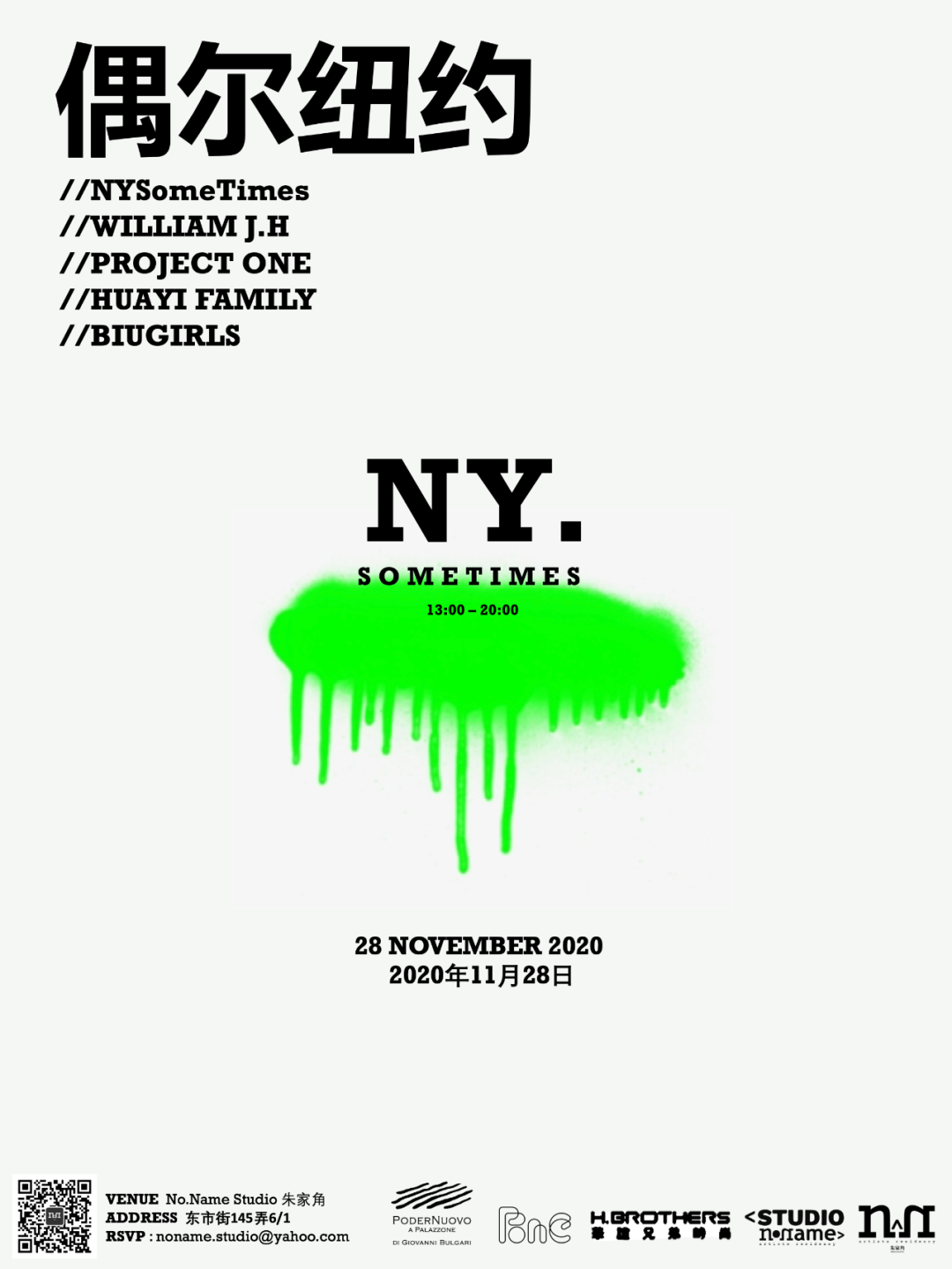
NYSomeTimes Poster
China Residencies: Since founding the space in 2020, you already started hosting programming and exhibitions. What are few of the most memorable events so far?
Carlo: A few weeks ago, we did a major an exhibition in collaboration with Huayi Brothers. It’s an art exhibition, and also a multi-sensory experience titled "NYSomeTimes". We presented our first resident artist, Bonny Guo. Now, we set up several important collaborations with organizations such as the Italian Culture Institute, and are also trying to establish strong partnerships for future programs. At the same time, we are open to any form of cooperation.

artwork by Bonny Guo artwork
Penny: Our cooperation with Huayi Brothers is a joint activity with Huayi Brothers Project One. [Project One is the children’s section for actors and entertainers of Huayi Brothers.] The children from Project One came to No.name Studio and turned it into a pilot place for children's art activities. It was a great opportunity to have people with different backgrounds to experience the art projects.
China Residencies: What opportunities do you have to offer artists to share their work with the public?
Carlo & Penny: We normally schedule an open talk of an artist at the beginning and an exhibition at the end of their residency in our partner venues in downtown Shanghai, such as this one with our current artist C.C, who is staying through January 2021. We have recently started collaborating with a car rental company that will provide us various fun car models such as the VW T2 minibus. We can customize it whenever we present a new artist, as a way of promotion.
China Residencies: And do you help artists in residence sell their work?
Carlo & Penny: Definitely yes! Art is a special asset class. It requires more involvement than other forms of investments. Artworks are by definition unique. Definitely, our priority is to promote our artists. We are very happy with our progress, because we have already sold some of the works by artists we collaborated with through our personal relationships and contacts.
China Residencies: How are you funding your residency space and program?
Carlo & Penny: This is a good question. We have decided to use our personal savings and resources to build this space to make sure we can account for the choices we make. This guarantees us enough freedom to choose and collaborate with like-minded local and international partners who agree with our mission. Apart from this, the artist residency program has sponsors from brands and venues that have embraced the project from the start. This allows us to cover additional management costs and to support and sponsor the residence and part of the materials to the artists we host.
China Residencies: Aside from the residency space, there are different rooms in use inside the space, like as a garage to renovate vintage motorbikes. What else is in the building?
Carlo & Penny: During these unusual times, without knowing when the borders of the country will reopen again, we are considering opening seven other loft studios with a communal sauna which anyone who stays at No.name can use. In addition, we also have a kayak and an inflatable boat with an electric motor that people can navigate along the canals of the town and go to bars in the evening for a drink or two. You must consider that, like Italian Venice, the particular urban appeal of this place is that you can move by walking and boating.
China Residencies: This sounds fascinating! What is the neighborhood like in Zhujiajiao around the studio?
Carlo & Penny: The neighborhood is one of the other things that makes this place very special. Our studio is located in the heart of the historical water town, the area around Shanghai has several of these water towns that are designated as UNESCO world heritage sites. The neighborhood is friendly and there are always people around happy to offer for help. This makes it a place where you can experience the traditional Chinese culture. The roofs of the buildings and alleys have more than a thousand years of history. This kind of traditional architecture and vibes are now difficult or almost impossible to find in a lot of urban cities.
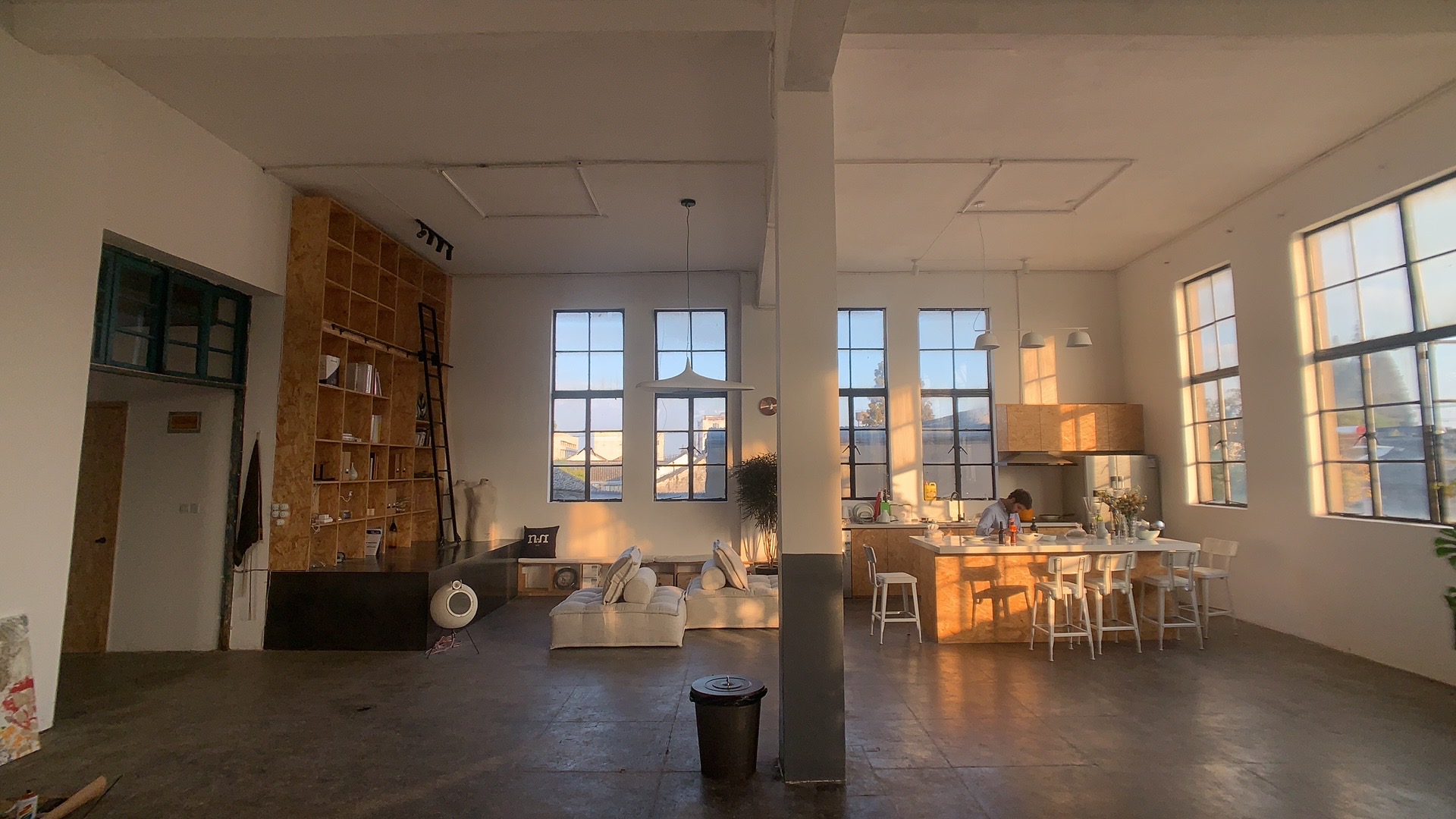
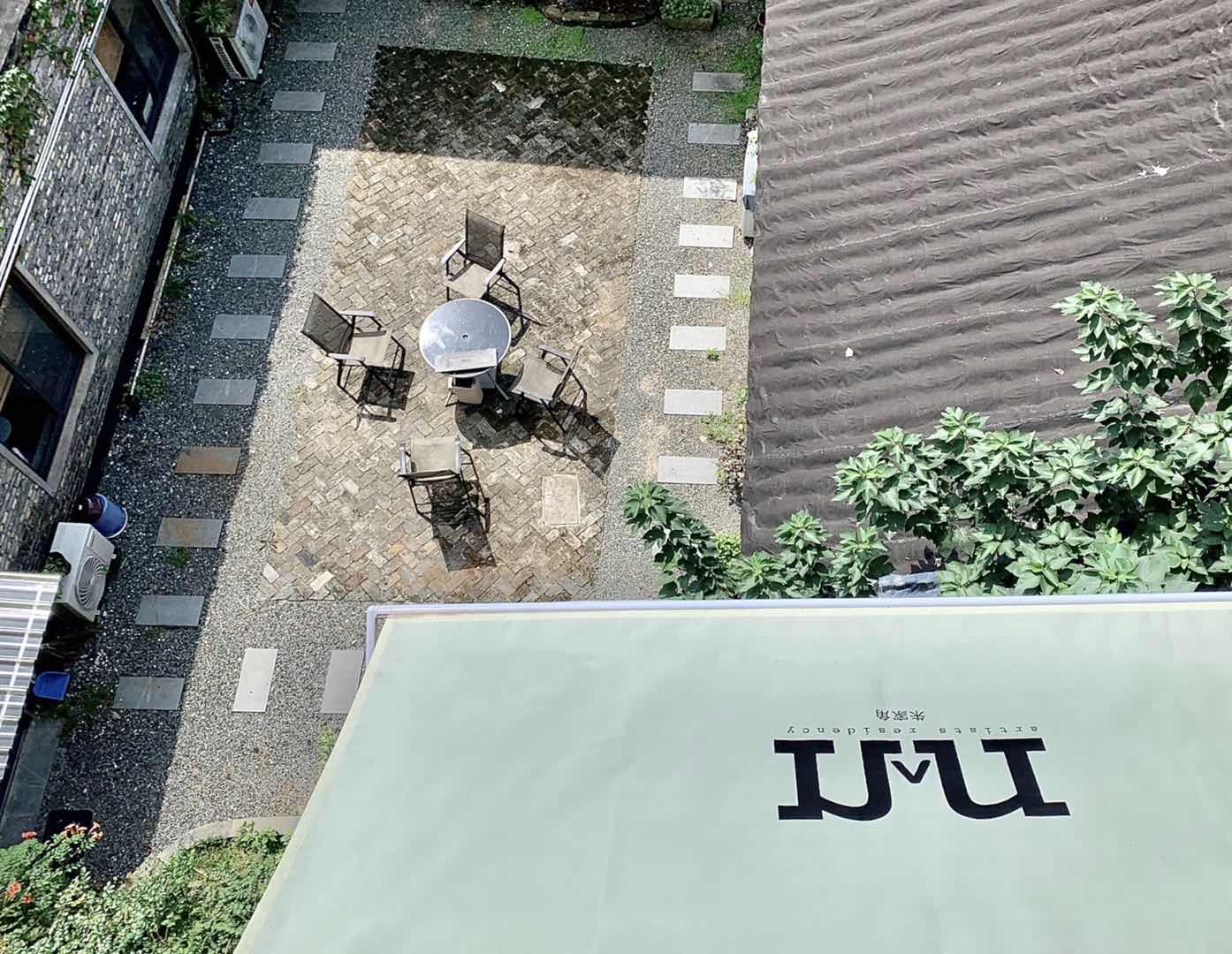
Studio space and surroundings
China Residencies: Can you tell us a bit about the residency application process, and which aspects you're looking for in artists?
Carlo & Penny: Well, basically we opted for two main methods to work with and host potential artists. The one way is a type of exchange. We select the artist through an open call, which we put out each month. We would like to sponsor the artist whose proposal has the potential to promote cultural exchange in the community. For this, we cover all costs that are necessary to finish a project. In exchange, we request one or two artworks the artist has produced during the residency, or possibly committing a small job if they were designers, architects or other types of artistic or creative professions.
The second way is the more “classical“ way in residency programs: we let the artist book and take care of the rental costs of the residency, as well as for their living cost and materials for the duration they stay at the residency.
China Residencies: How many on staff are you running the residency?
Carlo & Penny: At this moment we are about 6 people who take care of the marketing studio and the promotion of the residency. Our partners also support us on the basis of parallel events and activities.
China Residencies: Is there anything else you'd like to add about the program, your mission, or the opportunities you provide for artists?
Carlo & Penny: No.name Studio has always had the hope to bridge artists and their audience in a more intimate way and bring diverse and multi-disciplinary art experience to them. To achieve this, we initiated various crossover collaborations in 2021. Our mission is to open up a new market for artists and develop new marketing strategies for businesses through mutual collaboration. We want to represent and promote our residency artists through collaborations with diverse brands.
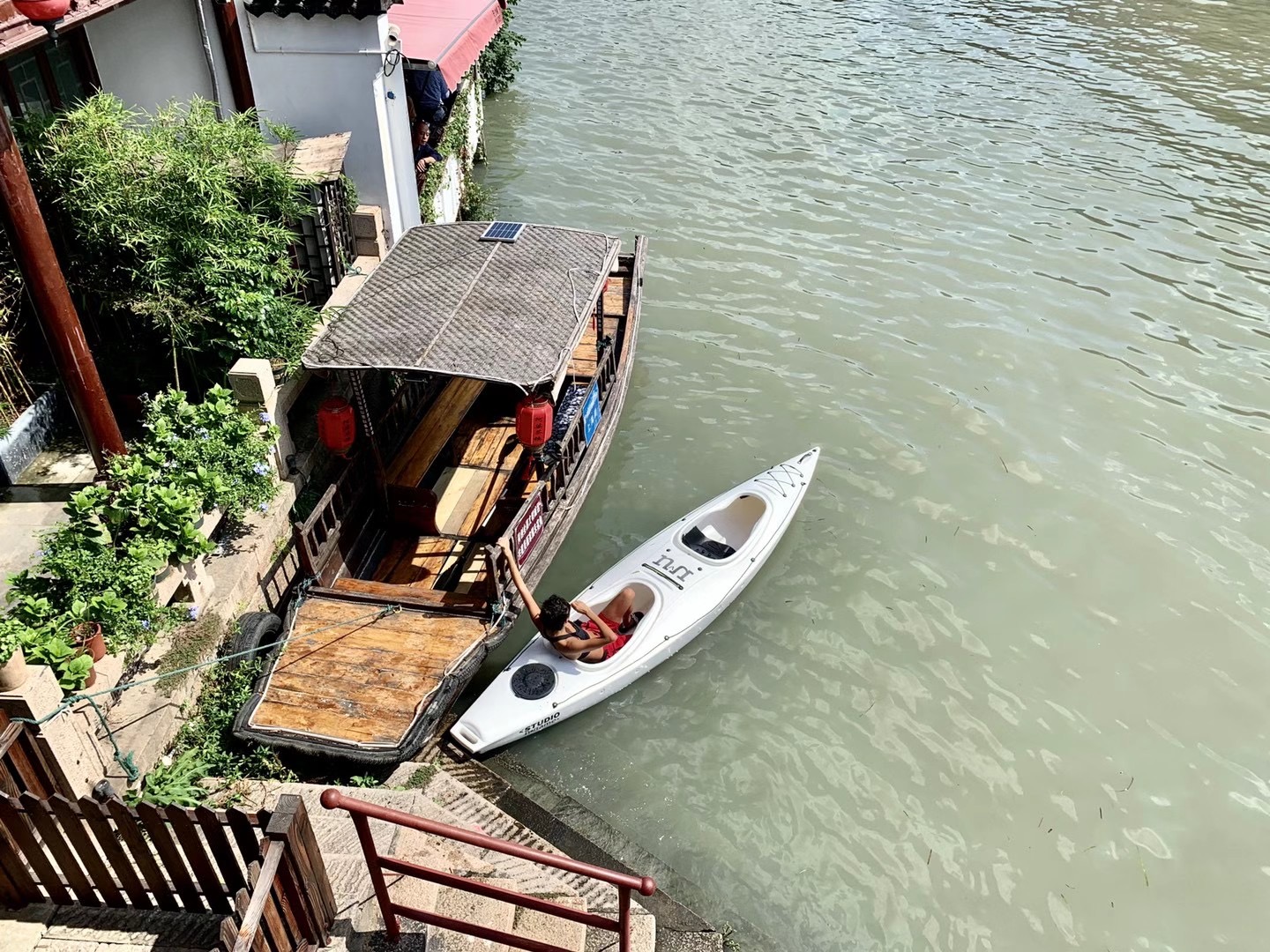

Kayak and car rental collaboration
China Residencies: What are your plans and hopes for No.name Studio in the upcoming years?
Carlo: I have a dream. We all know that Zhujiajiao is called the Venice of China. In Venice, Italy, they hold Biennale every two years, bringing together the most famous contemporary artists from all over the world. I dream that Zhujiajiao can also hold our own Biennale in the future. Of course, it's hard to say. Maybe this dream is too big, but I think Zhujiajiao is a suitable place to continue nurturing the engagement in contemporary art, because here you can really feel and enjoy the interaction between Chinese and Western cultures, and always find something new through art. This is what the place brings for me.
Penny: For me, art is a form of cultural exchange. Zhujiajiao is a symbol of Jiangnan culture in China. We founded No.name Studio in Zhujiajiao to let the world see the unique side of China through cultural exchange. More than 1000 years ago, business people gathered and stayed in this ancient water town to trade, they docked ships there. Will people come and stay here again because we are again having a prosperous cultural exchange? Through art and through us, we hope to invite people to visit and stay at Zhujiajiao again. What's more, is that Zhujiajiao has already a very good artistic soil. There are more than 200 artists living around here. It has become a new birthplace of contemporary art and a new art alliance. So, it feels natural and very lucky for us to start this project on this fertile cultural soil.
Carlo: Those are our dreams and goals. Of course, because of the new coronavirus, this will continue to be a difficult year. We hope that we can bring people from all over the world to China - once the borders are re-opened - especially to Zhujiajiao, to discover this incredible place, this historic place. Living here and creating something beyond expectation, artists from different regions and backgrounds come here to experience the authentic Chinese culture. These are the vibrant cultural collisions happening here. At the same time, Zhujiajiao is also very close to the city center of Shanghai. I think we can really create something completely different that we've never had before to bridge Zhujiajiao and downtown Shanghai, possibly in the future through our partnerships. We hope the way that No.name Studio facilitates cultural exchanges can go beyond presenting any single art form. We embrace different types of art, including music, songwriting, new media, video and so on.
Penny: Also, the water town Zhujiajiao has become kind of a new artistic ecosystem in China. Different parts of the world have different understandings of China. Same for when they are an artist. What is their artistic perspective? What kind of China do they see in their eyes? Are they eager to experience China's new art ecology? Maybe it can spark with the world outside of art. I think this is the most important factor that attracts different artists from all over the world to explore China and its different regions.
China Residencies: Thank you so much for the introduction and the insight into your projects. We also are looking forward when borders can safely re-open and for travel and exchanges to resume in person!
This interview was conducted by Xiaoyao Xu via WeChat for China Residencies in January 2021. All photos courtesy of No.Name Studio.
